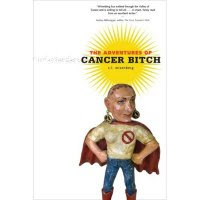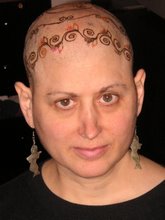Cancer Bitch is slightly traumatized (if that's not an oxymoron). She admits she did gain 30 pounds in her 40s, but she thought she was still sort of in the normal range. But today she went to the Y to meet for the very first time with a personal trainer and the trainer gave her that thing to hold in front of herself that looks like white binoculars except there's plastic where the lenses would be. It feels a little like a dousing tool but it supposedly sends out fat-seeking beams that report back to the device with a number. And that number corresponds to designations and according to the number, Cancer Bitch was designated as obese. How could this be?

[Bathsheba by Rembrandt]
Her friend G once said that women retain the image of themselves as they were at 30. Cancer Bitch wonders if this statement is accurate, first of all, and second of all, for the rest of someone's life. If you're 80, do you still think of yourself as you were at 30? When she was 30 Cancer Bitch had a very little bit of cellulite. When she was 28 she did aerobics and felt that she looked OK. But it has been a long time since she was 28. Does she think of herself as she was at 30? No. And she has a couple of items of clothing from yesteryear that she keeps around because she hopes one day to be able to wear them again. She will.
 [Renoir]
[Renoir]CB has not had sugar (well, not had foods that have a lot of sugar, like candy, cookies, cake, muffins) since December 28 and she has been rowing indoors with her
rowing team (which welcomes new members, with or without rowing experience). Shouldn't that count for something? CB also thinks that a person should get credit for the foods she's exposed to and does
not eat. That, too, doesn't seem like too much to ask, but the problem is there is no one to ask because, in her lights, there is no god or divine Mind running things, things just are. So buck up, Cancer Bitch. This is not the best of all possible worlds.
Alas, during CB's travels in November (Omaha, Houston, Atlanta, South Florida) she carried suitcases up and down stairs, which put pressure on her knees so now she can't jog or even do the elliptical without her knees hurting some. But her new personal trainer says she will give her exercises that will strengthen surrounding leg parts and help her knees. CB also picked up her suitcase and stored it in the overhead bin a few too many times and has some muscle pain in her back. She hopes it is muscle pain and not metastasis in her ribs. Yet there is this terrible terrible part of her that wants what they call "mets." How could this be? Metastasis is one more step toward death. Is it the dark drama of it she wants? She knows that only this thanatos-loving part of her wants...thanatos, death. She heard on the radio that teens under 15 don't understand the finality of death. Maybe CB is so immature that she is like a 15-year-old. Yet she has thought about death all her life. She is tired of writing about how she has always thought of death. But she does not want that warm oblivion. Or cool. She imagines it dark like a deep deep purple, a forever-sleep.
Cancer Bitch knows that she is a Holocaust Girl, a person obsessed with the Holocaust. She coined the term and wrote the
book. But she also wants to live and be strong (Hello, Lance Armstrong) and turn that fat into muscle or into nothingness. She wants the fat to disappear. How odd that parts of your body can disappear. She likes the flier that promises: Lose 150 pounds of ugly fat instantly. It's a flier advertising martial arts for women. (See, you push the guy away.)
For many years Cancer Bitch was tall and gangly. Her mother said she could be a model. Once where she was in her early teens she met with a modeling agent who looked at her and then ran her hands along her sides and said that she had the shape of a coke bottle. This was not a good thing in a model. CB was too short to be a model, too, but the agent didn't even bother with that. Over the years CB has become more triangle-shaped. A pyramid. A delta. This is not a good shape to be, even if we didn't live in a fat-obsessed society that oppresses women who do not conform to the unhealthily thin Hollywood ideal. Cancer Bitch will work on her muscles and cardio and she hopes one day to be a coke bottle again, but one with some umph to her. She will challenge you to an arm-wrestle, even.


















